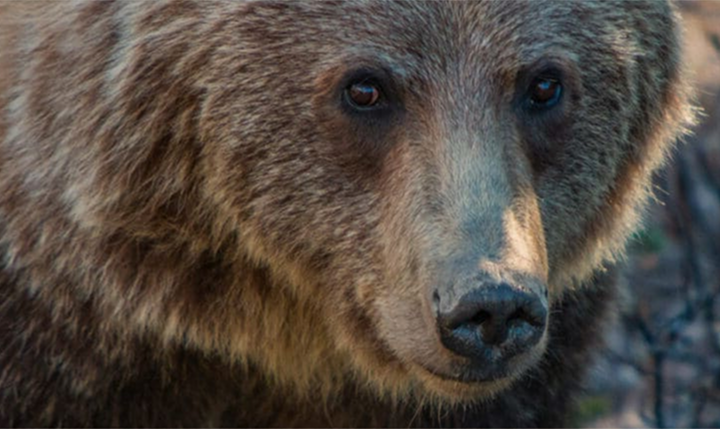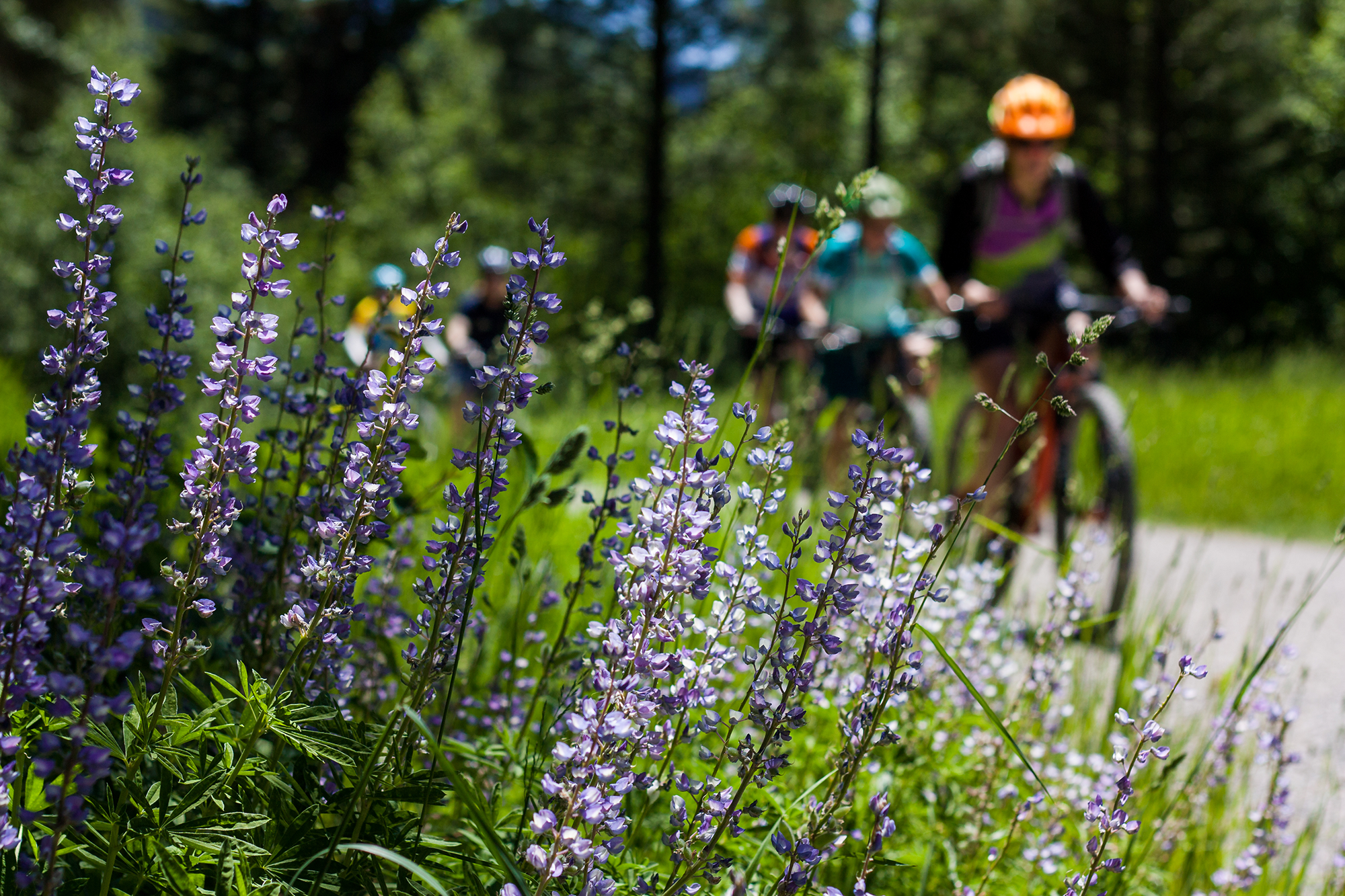Voices for protecting Alberta’s wild places, waters and wildlife matter
Found at the heart of the Yellowstone to Yukon region, Alberta’s landscapes of rolling foothills and enormous Rocky Mountains are home to most species of wildlife that existed when Europeans arrived hundreds of years ago, including grizzly bears, wolverines and native trout populations. The sources of clean drinking water for millions of people also originates in these mountainous areas.
The privilege of such gifts in our own backyard also means we have much to lose in Alberta. In 2020, that became abundantly clear when parks, wildlife and waters came under threat through a series of short-sighted decisions made without Albertans’ input or knowledge. People like you took note and sprang to action when nature needed it most.
In this story, you’ll meet Hilary, Y2Y’s senior Alberta program manager, her partner Jeff, and their daughters Clara and Paige. They have lived in Canmore for almost 10 years. As a family, they have been part of a collective and strong voice for Alberta’s wild places this past year.
Maintaining wildlife movement through the Bow Valley
In February 2020, Y2Y was among those community members shocked by a surprise approval of Canmore’s contentious Smith Creek wildlife corridor by Alberta Environment and Parks.
This wildlife corridor is adjacent to the proposed Three Sisters Mountain Village (TSMV) developments in Canmore. Science showed this approved corridor could actually hinder wildlife movement through the Bow Valley.
Less than a year later, TSMV released two new development plans, proposing to roughly double the size of Canmore. Each proposal could have a detrimental impact on wildlife and the community.

Jeff, a small business owner in Canmore, was involved with the volunteer-led group ‘Bow Valley Engage‘ throughout the lengthy process. He knew he had to speak out against the proposed developments due to their sheer magnitude, scope and short-sightedness.
“Like so many others, I got involved because I cherish Canmore and its unique situation as a stunning place that still sustains an amazing range of animals,” says Jeff. “In the public hearing, so many social issues were brought up, but underlying this was a consistent belief that a truly functional wildlife corridor is vital to Canmore. It shapes our community’s identity. People really take pride in this.”
He also interviewed other community members to share their perspective and stories on the impact the proposed developments would have on them and all they love about the Bow Valley.

After several readings and an extensive six-day public hearing on the issue with a near 90 percent opposition to the developments, Canmore’s town councilors voted 6 to 1 to reject the second of two proposals in May 2021. Over half of the people who spoke at the public hearing mentioned wildlife movement as a top concern.
The rejection of the first proposal by town council brought relief and elation, says Jeff.
“When the second proposal was turned down, I was super-emotional,” he recalls. “These engagement processes are energetically exhaustive and critical to our community. To actually have the desired outcome, which reflects what Canmore really wants, is a huge deal.”
Defending Alberta’s parks
In March 2020, Alberta announced its plans to privatize or cut hundreds of parks in an effort to save $5-million in the provincial budget. Many parks risked being stripped of their protected area status, risking critical wildlife habitat and the places Albertans hold near and dear.
People love parks, and thousands of folks like you didn’t waste time in speaking out for these special places. As a result, Alberta reversed course on their plan to delist and close more than 175 parks in the province by the end of the year.

Clara (age 9) and Paige (age 6) aren’t shy about their love for the outdoors, either. To them, some of the best parts of enjoying Alberta’s parks with their family are camping, canoeing and paddleboarding, and let’s not forget — eating marshmallows!
“I love camping because I get to eat marshmallows and enjoy nature,” said Clara. “I felt happy when I heard parks weren’t going to close because Jason Kenney [Alberta’s Premier] listened to us.”
“Parks are important for wildlife because they are more protected in them and can roam free,” added Paige.
“I love camping because I get to eat marshmallows and enjoy nature,” said Clara. “I felt happy when I heard parks weren’t going to close because Jason Kenney [Alberta’s Premier] listened to us.”
Clara, age 9, on the importance of Alberta’s parks
Whether you remember enjoying s’mores around the campfire as a kid, or find solace in special places as an adult, parks can be one of the places we make the most cherished memories and come to understand our role in protecting them. You can’t put a price tag on that.
Keeping open-pit coal mining out of the eastern slopes
Jump ahead to May 2020, the Alberta government opened more than 53,000 square kilometers of Alberta’s Rocky Mountains and foothills to open-pit coal mining after rescinding the 1976 Coal Policy.
There was public outcry from tens of thousands of people — youth from Indigenous communities, ranchers, celebrities, recreationists and many others. In February 2021, Alberta reinstated the coal policy, and formed the independent Coal Policy Committee to lead a public engagement process on a new, modernized coal policy, now underway.

Leading Y2Y’s Alberta program team, Hilary has been close to this rollercoaster of an issue over the past year. Yet, she remains hopeful.
“I have been most inspired by the way people have pulled together; especially hearing voices on this issue from disparate communities, including people who may have never spoken up on environmental issues before,” says Hilary. “It’s through the sharing of stories that we can find common connections and put ourselves in each other’s shoes.”
In the coal policy engagement survey done by the coal committee earlier this year, which received 25,000 responses in four weeks, the environmental impact of coal mining was the top-ranked issue.
“To have that many people share their concerns in such a short time is incredible — it really speaks volumes,” says Hilary. “Because so many people have shared their stories on how this issue impacts them, I feel there is real hope for positive change moving forward.”
“Because so many people have shared their stories on how this issue impacts them, I feel there is real hope for positive change moving forward.”
Hilary Young, senior Alberta program manager, Yellowstone to Yukon Conservation Initiative
While each of these issues are distinct, the positive outcomes we have seen to date have been evidence of one thing: Your stories and your voices matter greatly. None of these conservation wins could have happened without you.
But our work isn’t over yet, and it’s possible we’ll need your voices on these issues again.
Thank you for always speaking up when nature needs it most — for the love of mountains, marshmallows and memories!
This initiative has been generously supported by Alberta Ecotrust Foundation.


